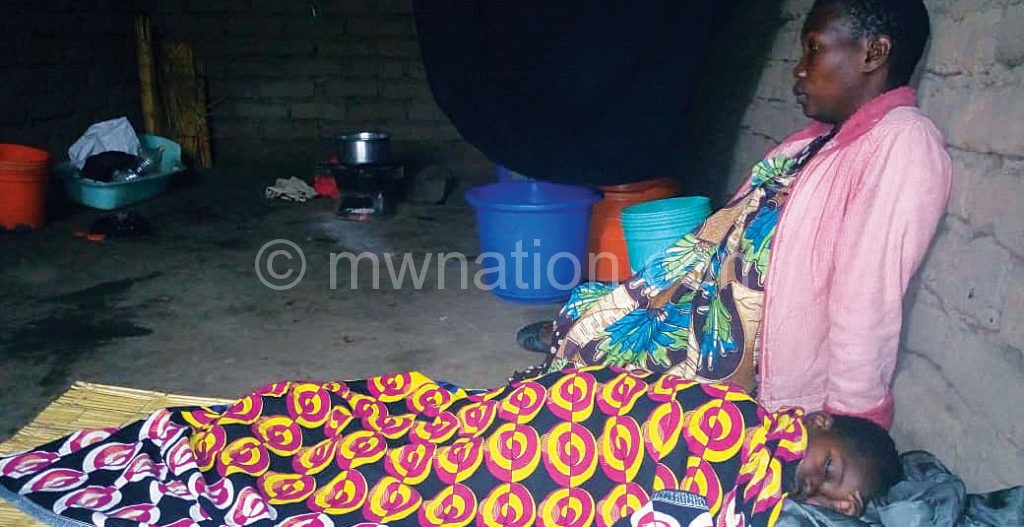Blindness crumbles man’s life
The life of Anderson Kampira, 40, a visually impaired man who lost his sight in 2016, has been shattered as he can no longer fend for his family, forcing his first-born daughter to get into an early marriage at the age of 17.
On Easter Sunday, Kampira, a family man with three childrens, spewed out the pangs of his new life without sight from his humble abode in Nkhukuteni 10 Village on the outskirts of Bangwe Township.

-once a skilled panel beater with one of the garages in Blantyre
Now at the mercy of neighbours and well-wishers, the family of the once a skilled panel beater, has become a liability to its community.
A visitor to the house is greeted by a steadily crumbling, no cement on the floor as the verandah is protected by stones. The house has no window panes and the outdoor ablution facilities are made of black polythene sheets.
The quietness at the house is deafening until his wife returns from her errands an hour later, followed by two of their children.
Kampira left the country in 2016 to seek greener pastures in South Africa only to be attacked by a sudden eye disease, which left him visually impaired barely a month of his search for fortune in the Rainbow Nation.
Last Sunday, when the Christian world was celebrating the resurrection of Jesus Christ, Kampira was sitting all alone in the sun, hungry and weak, waiting for his wife to return from the river where she mines sand for sale to keep the household going.
“My life has been like this for the past two years, which has affected my household to the extent that we have sold all our furniture in a bid to raise money for upkeep and medical bills. Unfortunately, it seems the cycle of poverty will not spare my children since I cannot raise school fees for them. My daughter, who was showing academic brilliance, is now a mother at 17 because she could not get school fees,” Kampira explains.
He recalls that the beginning of his problem was sudden and unexpected, when he just felt some pain in his eye before total darkness creeped into both eyes.
At his return to Malawi, he was treated at the Eye Hospital at Queen Elizabeth Central Hospital (Qech), where they failed to restore his sight, forcing him to resign to fate and wait for a miracle to happen.
Kampira struggles to walk, he refuses to go on the street to beg, hoping that some day his sight will be restored but, meanwhile, the fabric of his household is being eaten up.
His story mirrors challenges of most people with disabilities in the country, including those with visual impairment, who are bearing the brunt of inconsistent social protection mechanisms.
According to executive director of the Malawi Union for the Blind (MUB), Ezekiel Mkandawire, Malawi has 170 000 people registered with visual impairment, with 57 000 out them still attending school.
The World Health Organisation (WHO) website says the prevalence of visual disability in Malawi is at 23 percent.
It says, globally 1.3 billion people live with some form of vision impairment, with leading causes being uncorrected refractive errors, cataract, age-related macular degeneration, glaucoma, diabetic retinopathy, corneal opacity and trachoma.
From the testimony of Kampira’s wife, Florence, the struggle is real for the woman who has now shouldered the whole responsibility of fending for the family which includes taking care of a man who cannot take care of himself.
Says the wife: “It is disheartening because at first things were not like this. My husband was ably working and he is the one who constructed this house. But since 2016 everything turned upside down. Sand mining is not for the faint-hearted. It is a hard job that pays less. A 15-litre bucket of sand will only give you K50 kwacha. I am worried about the children. I have already lost one to an early marriage.”
Kampira’s other two children are in primary school with the second-born daughter in Standard 7, raising fears of her dropping out before she goes to secondary school.
One of Kampira’s neighbours, Linda Kampeni, prayed that authorities would rescue people with various physical challenges such as Kampira, especially those who could not fend for themselves.
MUB’s Mkandawire says: “The first thing we need to do is take that man for counselling. There are many people who have lost sight for different reasons. If someone suddenly becomes blind then the world crumbles. One needs to be psychologically trained to accept their situation and move on. This includes the guardians too, then we would establish what qualifications or skills the person has, to gauge how he can be assisted.”
Mkandawire cites examples of people who lost their sight and have been trained by MUB in Mulanje to read and write in braille before they are redeployed.
He says apart from the counselling, people who have lost sight require assistive devices to move from one place to another to give them the ability to move on their own without relying on other people.
When contacted, Minister of Gender, Children, Disability and Social Welfare Cecilia Chazama, in a telephone interview yesterday, said government had released funding to the Mulanje School for the Blind and Vocational Skills to rehabilitate people who are facing such challenges. “It is important that people should know what to do under such circumstances. Like in the case you are citing, they should immediately report to the district social welfare office who will link them up with relevant institutions. As for bursaries, they are still being given to those deserving but they depend on time for registration. What is important is that people who are facing such challenges should be equipped with skills to run their own lives,” she said.





